
Donald Trump has taken the most risky and potentially devastating step of his second mandate: a large -scale air attack against Iran’s main nuclear facilities. In an operation described by its advisors as “limited and contained”, the White House seeks to sell it as a surgical blow aimed at neutralizing a growing threat, not to start a total war in the Middle East.
The attack – who accurately hit the Sites of Fordow, Natanz and Isfahán – constitutes a high -risk commitment by Trump. Unlike other measures of its administration, such as the commercial tariffs that ended up diluting, here the president has gone “until the end”, even disregarding the advice of key allies within the Maga Movement. The question now is whether this offensive will be seen as a successful nuclear containment maneuver or the first act of a war that could consume the region – already its presidency.
A clear -free strength strategy
Trump’s message was clear: any Iranian retaliation will cause a “much stronger” response from Washington. In their eyes, Iran is going through a moment of weakness, worn out by months of Israeli attacks and pressed for economic sanctions. Weakness that allowed American bombers B-2 to enter and leave the Iranian territory with hardly any resistance. Surrounded by US forces and under Israeli air domain, the Shiite regime could hardly sustain prolonged confrontation, their advisors say.
In other words, despite the decision to attack nuclear facilities, the United States wants to avoid being involved in a prolonged war. Trump hopes that the US can absorb limited Iranian retaliation and try to stay out of a deeper involvement in the war. This strategy could work, but it is incredibly risky. It is that the dilemma on the continuation of military intervention will intensify if Iran persists in its challenge and does not meet the demands, or if it turns out, Iran continues to keep a significant nuclear capacity. Although strongly beaten, the Iranian regime still retains a wide capacity to respond: it can activate allied militias, close the Ormuz Strait, attack US interests or even hit the Gulf’s petromonarchs directly (although the latter would isolate it more than the states of the region). The options are on the table, and none of them excludes an escalation, although the costs of this course are very high.
The difficult Islamic regime options
Iran is at a tragic crossroads. It can opt for containment and seek a negotiated exit, although this would imply accepting a position of extreme weakness, both internally and regionally. It would be, for many within the regime, an intolerable capitulation. Or it can respond strongly, dragging the region to a greater conflict that would put not only military balance, but the survival of the Islamic Republic itself.
Most likely, Tehran could bow down a third way: a calibrated, symbolic but noisy retaliation, which allows him to save appearances without crossing the red lines of Washington. The missile launch in Israel after the bombings still does not show a jump in the answer. The objective would be to maintain internal cohesion, minimally punish the US or its allies, and avoid open war. An output “to the Sadam Hussein” after the war with the United States in 1991, where Washington preserved the Iraqi leader, who started a fierce internal repression to stay in power. But even that containment has risks. A calculation error is enough, an American victim, a too visible attack, so that the conflict overflows. As Ilan Goldenberg prevents in an article in the Foreing Affairs written after the US attack: “accidents and calculation errors could get worse. United to an even deeper conflict ”(Américas War with Iran: What comes after us strikes).
A war that redefines alliances and warnings
Trump justified the attack as a necessary act to “prevent them from developing nuclear weapons.” He publicly thanked Benjamin Netanyahu before the American pilots themselves. The gesture was not accidental. Israel was not only informed, but would have played a key role in the operation and political pressure that led to this decision. One more proof that “Tel Aviv no longer acts simply as Washington’s ally, but as an actor who seeks to manipulate his protector. This represents a dangerous investment of the traditional division of roles between the imperialist center and its client states, with unpredictable consequences in the various global geopolitical scenarios, where Washington intended to delegate his old global police role.”
But this alignment can have strong consequences, within the United States. In American public perception – especially between nationalist and isolationist sectors of the magician – any human, economic or military cost derived from this offensive will also fall on Israel. The voices of figures such as Tucker Carlson and Steve Bannon, who warned against a “new Iraq”, could be reinforced if they will opt for a strong response. Let’s take into account that in the opposite spectrum of the political board, Israel’s behavior in Gaza has already drastically reduced support for the alliance between the United States and Israel. The consequences could be fatal if the United States is involved in a war in which the majority of Americans do not believe that they should participate and this goes wrong, American public opinion will become strongly against Israel.
The world takes note: without bomb there is no guarantee
The bombing of Iran not only marks a turning point for the presidency of Donald Trump, but could redefine the global security architecture for decades. The message he leaves is brutal in its clarity: deterrence is no longer based on treaties or negotiations, but on the ability to hit first and forcefully.
For Iran, the dilemma is lethal: climbing and risking the total destruction of the regime or accepting an agreement from a humiliated position, possibly under persistent threats. But even if you opt for containment, the regime will hardly forget the lesson: not having the pump was your strategic error.
Beyond the Persian Gulf, the echoes of the attack already resonate in Pyongyang, Islamabad, Beijing and Moscow. In a world where the United States can launch a large -scale operation without the approval of Congress, without international mandate and without immediate consequences, the pure logic of the relationship relationship is imposed on diplomacy.
The question that floats in all the world’s chancellors is not what Iran will do, but who will be the next one to look for its own nuclear guarantee. Because after Fordow, Natanz and Isfahán, what is clear is that the only real red line in this new world disorder is not the illusion of an alleged “international legality”, but the capacity for mutual destruction insured.
In other words, with his action Trump not only bombed Iran, he also dynamited the fragile balance on which a minimum spectrum of a global order still rested. One more proof, after the Ukraine War and the genocide in Palestine, of the accelerated entry into a time of wars, crisis and possibly revolutions, which perhaps are preparing in this world that is agitated and, without a doubt faster than the governments and state of all those reactionary capitalist states that increasingly control the course of the events.
Source: www.laizquierdadiario.com

